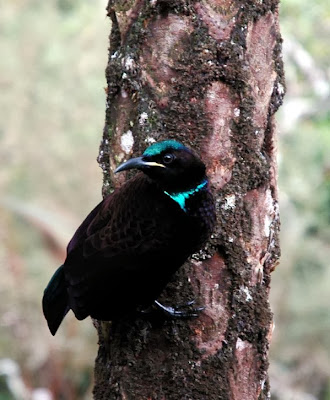 |
| Paradise Riflebird Displays on Perch |
Ptiloris Paradiseus:
The
Paradise Riflebird, belongs to the birds of paradise (Paradisaeidae
family). Its scientific name is Ptiloris paradiseus. Ptiloris is a Greek word, which means feathered nose or
alluding to plumes at bottom of upper bill; and paradiseus is a Latin word, which means paradise. Its
common name presumed on ornamental appearance colours of plumage to uniforms of
British riflemen. Like other birds of paradise they
are Sexually dimorphous. The adult male is approximately 30 cm long, passerine bird  |
| Young Paradise Riflebird |
of the Paradisaeidae family. and female is about 29 cm long. The adult
male entirely jet black greenish blue iridescent crown and triangular breast
shield, underparts with iridescent oily green glaze and central pair of tail
feathers iridescent greenish blue above.
The adult female has rufous brown top, with wide pale stripes across top
of head to the rear of head and light cinnamon with dark brown chevrons from
downside. The adult female is usually unadorned.
 |
| Paradise Riflebird Mating Rituals |
Behaviour:
The Paradise
Riflebird is polygynous. Adult males solitary and shows at traditional perches
spread out through forests. Male perches above court, flicking wings and
fanning tail, swaying legs and pectoral shields and gaping mouth to show inner
bright stripes. which is maintained as he dances around court.
 |
| Paradise Riflebird |
rainforestsof New South Wales and Central Queensland just north of Newcastle.The Paradise
Riflebird feeds on fruits and animals, mostly on insects and spiders. The breeding
occurs during August to February and peaking September to January. Only female
builds and attends the nest for hatching, this process takes 18 to 19 days,
nestling period minimum 21 days. Hybridisation is not possible as this species
does not occur with any other bird of paradise. No threats found, although
substantial areas of habitat lost to clearing.
No comments:
Post a Comment